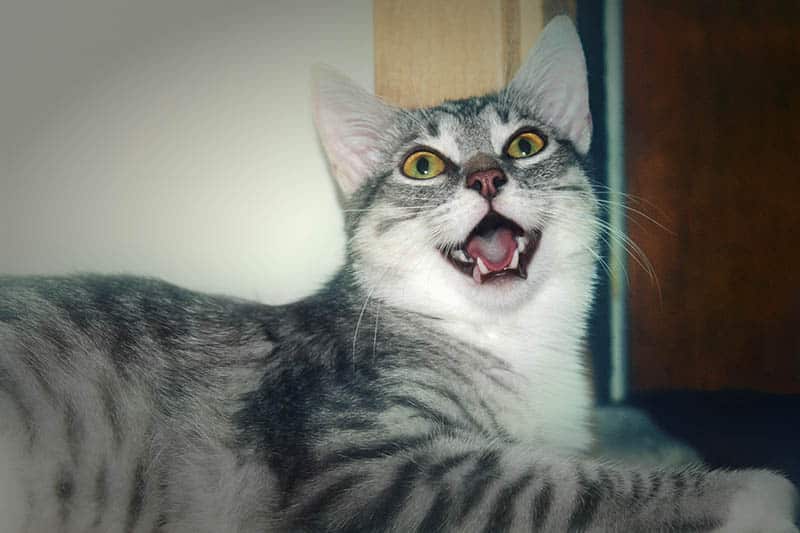Of the many differences between cats and dogs, one of the more obvious ones is the way they breathe. Dogs mainly breathe with their mouths open, while cats generally breathe with their mouths closed. Because cats rarely do it, the sight of a cat panting or breathing with his mouth open is something to pay attention to. There are several reasons why a cat might pant or show labored breathing — some benign and some not so benign.
Heavy Breathing in Cats: When to Call the Vet
- Cats will sometimes pant if they’re playing very boisterously. This is much more common in kittens, who run and wrestle and sometimes just don’t know when to stop! While the panting isn’t anything to worry about, if you see it occurring, calmly separate the kittens, let them catch their breath and then just monitor them during future frantic play sessions.
- Cats tolerate heat quite well, but when in a situation where it gets too hot, they may start to pant. Examples are when they are in a car or other closed-in space and have no access to a shady, cooler spot.
Humans have sweat glands all over their bodies, allowing for efficient dissipation of heat. Cats have sweat glands on the pads of their paws and between their toes. This is not enough surface area to effectively regulate their body temperature. To prevent themselves from overheating, they pant, dissipating the excess heat via evaporation.
- Stress is another reason for cats to pant. As a veterinarian, I’ve seen this countless times. Cats are averse to traveling, and they clearly dislike being confined to a cat carrier. I’ve had many cats arrive at my practice agitated and panting, and I’ve had to quickly triage them to make sure that the panting is just from stress and not from something more nefarious.
- Cardiac conditions can cause labored breathing in cats. Cardiomyopathies (disorders of the heart muscle) are, sadly, fairly common in cats. In many cases, these conditions progress slowly.
Cats, being adept at hiding their signs of illness, may not reveal that there’s a problem until late in the game, when congestive heart failure begins to develop. Fluid may build up in and around the cat’s lungs, resulting in labored breathing. The respiratory rate increases, and although the cat may outwardly be at rest, the chest is noticeably moving in and out, giving the appearance as if the cat has just jogged around the block a few times. Severely affected cats may breathe with their mouths open, which is a dire sign.
Early intervention is crucial if a cat is to recover. If you think your cat’s breathing might be labored but aren’t completely certain, err on the cautious side and have the cat promptly examined.
- Respiratory disorders can also cause labored breathing in cats and are very common. The most common of these are viral upper respiratory infections (URIs) and often result in nasal discharge that obstructs the flow of air through the nostrils, making it difficult for cats to breathe. The labored breathing associated with URIs generally isn’t too worrisome, as it is due to nasal and sinus congestion, rather than a lung disorder, which would be a greater concern. The nasal congestion from a URI tends to be noisy rather than labored, and rarely causes cats to breathe with their mouths open.
However, I’ve had a few overbred Persian cats in my practice, with markedly flat faces and exceptionally tiny nostrils, acquire a URI, and these cats really paid the price. The nasal discharge completely obstructed their nostrils, and they were forced to breathe with their mouths open. As we’ve noted, breathing with the mouth open is not natural for cats, and these poor kitties were miserable, barely able to sleep, until their colds resolved.
Asthma is a very common respiratory disorder in cats and is very similar to asthma in humans. The airways in asthmatic cats are hyper-reactive and may undergo spontaneous constriction or narrowing when exposed to certain substances or allergens. Asthmatic cats develop increased mucus in their airways, airway inflammation, coughing, wheezing and labored breathing.
Most cats present to the veterinarian with a history of chronic coughing, but some cats present with acute, severe signs — wheezing, labored breathing, and sometimes panting or open-mouth breathing, the so-called “asthma attack.” An asthma attack is a veterinary emergency that requires immediate care. Asthma tends to respond well to treatment with anti-inflammatory medications (given orally or via specially designed kitty inhalers) and bronchodilators (drugs that widen the air passages).
Breathing with the mouth open does not come naturally to cats, and they find it distressing. If your cat is panting and you’ve ruled out the common causes, or if you suspect he’s breathing more heavily than normal, regardless of whether his mouth is open or not, his abnormal breathing pattern may be a sign of something more serious, and prompt veterinary care is necessary to determine the cause.
Panting Versus Labored Breathing: What to Look for
- Panting in cats looks similar to panting in dogs.
- Panting tends to occur acutely from environmental factors, such as overheating, anxiety or overexertion.
- Labored breathing (the medical term is dyspnea) tends to develop slowly over time, sometimes days or weeks.
- Labored breathing could be a sign of a serious medical
Feature Image Credit: Zhuravlev, Andrey, Shutterstock





